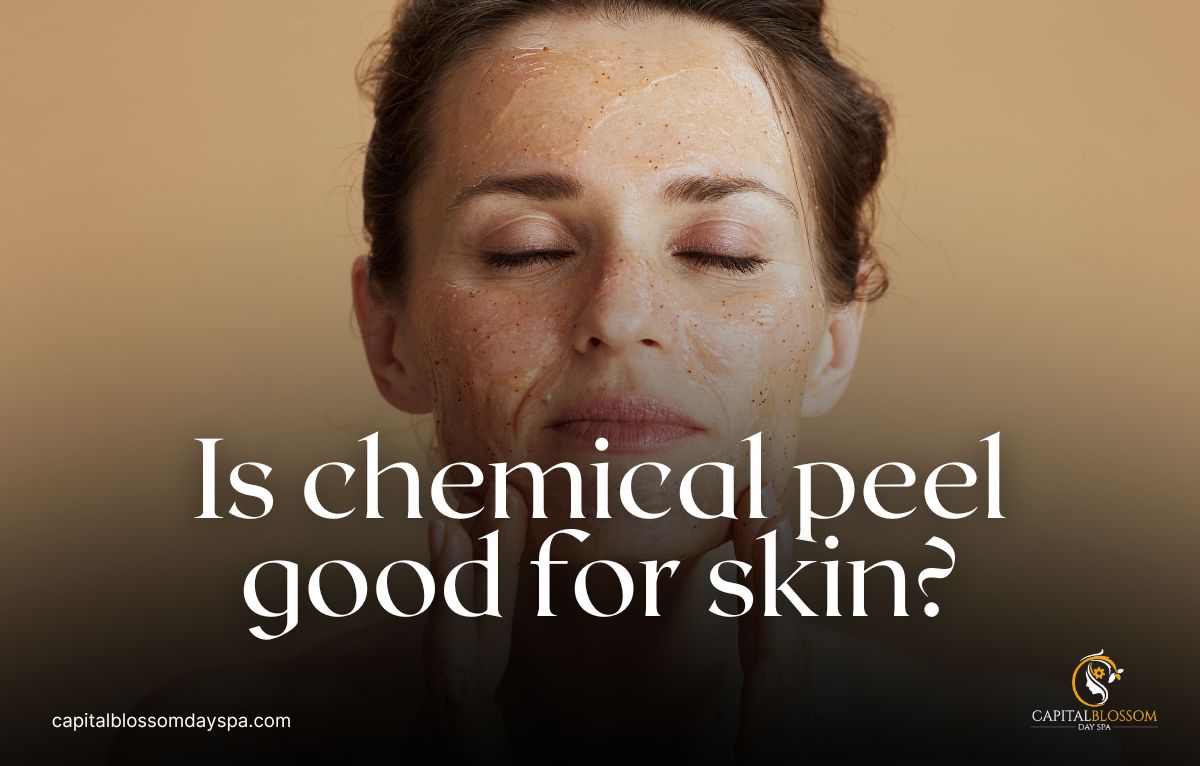
Is Chemical Peel Good For Skin?
Wondering if a chemical peel could be the right choice for your skin? With promises of smoother texture, reduced blemishes, and a brighter complexion, chemical peels are a popular treatment for many skincare concerns.
But with so many options — from mild peels to deeper, intensive treatments — it’s essential to understand what a chemical peel really does for the skin.
In this blog, we’ll break down the benefits, types, and things to consider before trying a chemical peel, so you can decide if it’s the right move for your skincare journey.
Whether you’re aiming to reduce acne scars or address early signs of aging, learning the ins and outs of chemical peels can help you make a well-informed decision.
Let’s dive into how this treatment works and what you should know to get the best results.
What is chemical peel?
A chemical peel is a cosmetic treatment that involves applying a solution to the skin, causing the outermost layers to exfoliate and eventually peel off.
Once the old skin sheds, new, regenerated skin takes its place.
The treatment is available in different strengths—light, medium, and deep—each offering varying levels of exfoliation and targeting specific skin concerns.
How Chemical Peels Benefit the Skin
Chemical peels offer several benefits, depending on the type and strength of the peel.
Here’s how chemical peels can improve skin appearance:
1. Improves Skin Texture and Tone
One of the main reasons people opt for a chemical peel is to address uneven skin texture and tone.
Chemical peels remove the top layers of dead skin, revealing fresher, smoother skin underneath.
This process can soften rough patches, reduce the appearance of fine lines, and give a more youthful look to the skin.
2. Reduces Acne and Acne Scars
For those struggling with acne or acne scars, chemical peels can be quite helpful.
Light peels, such as those with alpha hydroxy acids (AHAs) or beta hydroxy acids (BHAs), help unclog pores, reduce oil production, and fight acne-causing bacteria.
Chemical peels can also reduce the appearance of shallow scars, promoting a clearer complexion over time.
3. Minimizes Hyperpigmentation
Chemical peels can help fade dark spots, sun damage, and melasma through encouraging cell turnover.
With consistent treatments, individuals with pigmentation issues often notice a more even skin tone.
4. Boosts Collagen Production
Medium and deep peels go beyond the surface, reaching deeper skin layers to stimulate collagen production.
This boost in collagen helps firm up the skin, reducing the look of wrinkles and sagging.
So, for aging concerns, a chemical peel might be a good choice for promoting a younger appearance.
Types of Chemical Peels and their Benefits
Chemical peels come in various types, each suited to different skin needs. Here’s a breakdown of the common options:
1. Light Peels (AHAs and BHAs)
Light peels, like glycolic and salicylic acid, offer mild exfoliation. These are suitable for treating minor skin issues such as dullness, mild acne, or slight unevenness.
Since they are gentler, they have little to no downtime, making them ideal for anyone seeking a quick refresh. So, is chemical peel good for skin when it needs a subtle glow? Light peels might be the answer.
2. Medium Peels (Trichloroacetic Acid or TCA)
Medium peels penetrate deeper than light peels, making them suitable for treating more significant issues like deeper wrinkles, moderate discoloration, and some types of scars.
However, they may require a few days of downtime as the skin regenerates.
For people with more pronounced skin concerns, medium peels offer stronger results.
3. Deep Peels (Phenol Peels)
Deep peels provide the most intense level of exfoliation and are typically used for treating severe skin conditions. Because they penetrate deeper skin layers, these peels often come with a longer recovery period.
However, they can deliver dramatic improvements in skin texture, deep wrinkles, and severe pigmentation. A deep peel might be worth it for those with substantial skin concerns who are seeking a major improvement.
What to Expect During and After a Chemical Peel
The process generally begins with a consultation to assess skin type and concerns, followed through the application of the peel solution.
During the Peel. The solution is applied to the skin and left on for a specific time, depending on the type and strength of the peel. There may be a tingling or mild burning sensation as the peel works to exfoliate the skin.
After the Peel. Following a peel, the skin may appear red and feel sensitive, much like a mild sunburn. For stronger peels, the skin may start to peel within a few days, revealing new skin underneath. Post-peel care is crucial, as the skin is particularly sensitive to sun exposure, requiring good hydration and sun protection.
Who Should Avoid Chemical Peels?
While chemical peels can be highly effective, they aren’t suitable for everyone. People with certain skin conditions, such as eczema or rosacea, may find that chemical peels irritate their skin further.
Additionally, individuals with dark skin tones should be cautious and consult a specialist, as certain peels may increase the risk of pigmentation changes.
For those with sensitive skin, light peels may be the safest option, and a professional can help determine the best course of action.
In deciding “is chemical peel good for skin,” it’s essential to factor in individual skin characteristics and consult a skincare professional before proceeding.
Is Chemical Peel Good for Skin?
Chemical peels can offer significant benefits for many skin concerns, from acne and pigmentation to fine lines and rough texture.
While they may not be suitable for everyone, they can be an effective option for those looking to refresh their skin, improve tone, and address specific issues.
At Capital Blossom Day Spa, we offer customized chemical peels designed to suit different skin types and concerns.
Our experienced team can help you choose the best peel for your unique skin needs, ensuring safe and effective results that leave you feeling confident and radiant.
For those still wondering, “is chemical peel good for skin?”—we’re here to guide you through each step to help you achieve the best results for your skin.
Learn more about our services at Capital Blossom Day Spa, and let us assist you in finding the right solution for your skin goals.
